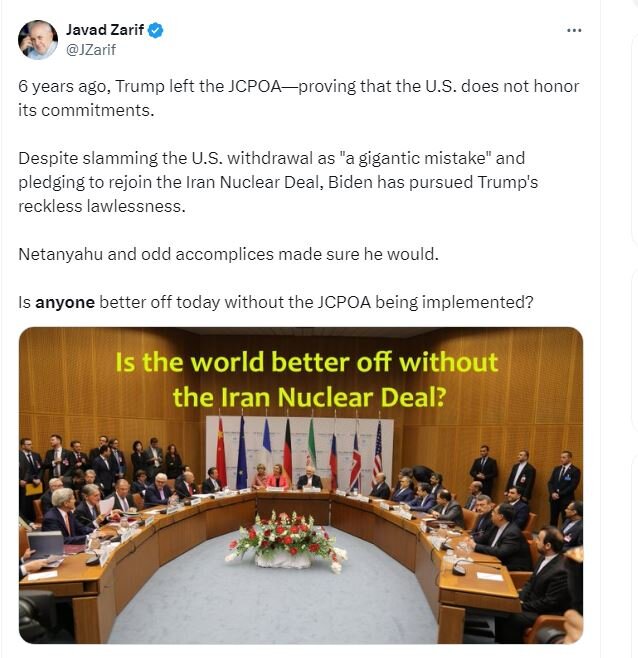TEHRAN- Former Iranian Foreign Minister Mohammad Javad Zarif has launched a critique of U.S. President Joe Biden's handling of the 2015 Iran nuclear یeal, labeling it as "reckless lawlessness" reminiscent of his predecessor's errors.
Taking to Twitter, Zarif highlighted the history of the deal, emphasizing Trump's abandonment of the Joint Comprehensive Plan of Action (JCPOA) in May 2018, which, he argues, exposed the U.S.'s disregard for its international commitments.
"6 years ago, Trump left the JCPOA—proving that the U.S. does not honor its commitments. Despite slamming the U.S. withdrawal as a gigantic mistake and pledging to rejoin the Iran Nuclear Deal, Biden has pursued Trump's reckless lawlessness. Netanyahu and odd accomplices made sure he would. Is anyone better off today without the JCPOA being implemented?" Zarif said.
In addition to withdrawing from the Iran nuclear deal, former U.S. President Donald Trump also highlighted concerns about Iran's defense capabilities, signaling intentions to curb its missile program.
Employing sanctions as a tool, Trump's administration aimed to maximize pressure on Iran, hoping that these measures would effectively constrain Iran's defense capabilities.
Despite pledges from the Biden administration to reengage with the JCPOA, progress has been slow, with Tehran expressing doubts about Washington's sincerity.
Iranian Foreign Minister Hossein Amir Abdollahian has underscored the need for the U.S. to demonstrate genuine commitment to reviving the agreement, citing "a lack of political will" on the part of the Biden administration.
In September 2023, during the 78th session of the United Nations General Assembly, Iranian Foreign Minister Hossein Amir Abdollahian engaged in discussions with American experts on the sidelines of the event. He expressed optimism regarding the potential revival of the 2015 nuclear deal, emphasizing the importance of genuine commitment from the U.S. administration as a prerequisite for progress.
He called Iran’s policy regarding the deal “ an international agreement,” reiterating, “If the U.S. administration is serious, the [nuclear revival] negotiations can be concluded in a short time and then all the parties will return to the JCPOA and their full commitments.”
He further criticized the U.S. administration for pursuing a contradictory approach to Tehran with "fundamental" differences in what the White House practices and what it preaches.
Meanwhile, Iran continued to fulfill its obligations under the JCPOA, even after the U.S. withdrawal.
Recent developments, including a prisoner swap and the release of frozen Iranian funds in South Korea, provided some glimmer of hope for diplomatic progress. However, Iranian President Ebrahim Raisi emphasized the need for tangible actions from the U.S. to build confidence and facilitate further negotiations.
On August 10, 2023, Iran and the U.S. freed 10 prisoners - five Iranians and five Americans - after the U.S. government unblocked the transfer of $6 billion in frozen Iranian oil funds held in South Korea.
The Iran nuclear agreement, formally known as the Joint Comprehensive Plan of Action (JCPOA), is a landmark accord reached between Iran and several world powers, including the United States, in July 2015. Under its terms, Iran agreed to dismantle much of its nuclear program and open its facilities to more extensive international inspections in exchange for billions of dollars worth of sanctions relief.


No comments:
Post a Comment